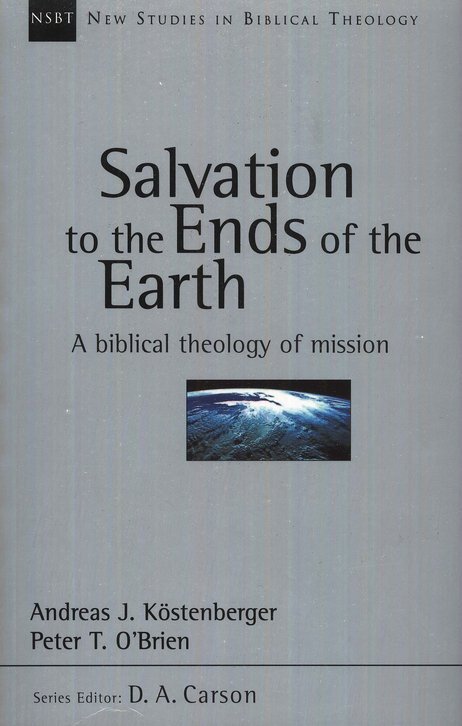Andreas Koestenberger and Peter T. O’brien, Salvation to the Ends of the Earth: A Biblical Theology of Mission (New Studies in Biblical Theology, Volume 11). IVP Academic, 2001.
Referenced in:
- Theology and Practice of Evangelism – Missionally Responsive/Evangelical
- Theology of Mission, Proposals and Formulations – Missionally Responsive/Evangelical
LifeandLeadership.com Summary
This is a very substantive theology of mission written from a conservative evangelical viewpoint. It is part of IVP’s well-respected series on theological issues edited by D. A .Carson. It is one of my first recommendations for those interested in the theology of mission. No one approaches such a study without presuppositions, but a text such as this is the closest thing to an objective survey of Scripture. It may serve as a foundation for further investigations theologically or missiologically.
The introduction describes the authors’ biblical-theological method. They approach their task not as neutral observers or mere academics, but as those who are passionate “to see God’s mission carried out in today’s world.” (20) They do not write as systematic theologians or missiologists, but out of a biblical-historical perspective, follow the canonical order and “examine the various portions of scripture regarding their respective contributions to the biblical theme of mission.” (20) Also, their high view of the divine inspiration of Scripture demands that such a study “proceed with the expectation that the message of the biblical writings regarding mission will turn out to be more than a conglomerate of disparate data.” (20) Instead it will reveal “the biblical-theological interconnections between the different portions of scripture.” (21) Certainly one may expect
“a certain amount of diversity in the scriptural teaching on mission. Since Scripture, however, is ultimately God’s Word, we may legitimately expect to see an underlying logic and unity in the biblical message on the subject. For Scripture is united by one primary pervading purpose: the tracing of God’s unfolding plan of redemption. It everywhere assumes that this God acts coherently and purposefully in history.” (20)
This description of methodology is followed by chapters surveying mission as revealed in the major sections of Scripture. First is the Old Testament with emphasis on the Abrahamic promise. The next chapter considers whether second-temple Judaism actually had a mission. The next three chapters look at the Gospel accounts, starting with Mark, and then on to Matthew and Luke-Acts. This is followed by a close look at the Pauline corpus, the writings of John (emphasis on the fourth gospel), and finally the General Epistles and Revelation. A helpful chapter at the end provides a summary, and concluding observations and implications.
From the Publisher
Few biblical topics are as important as mission. Mission is linked inextricably to humanity’s sinfulness and need for redemption, and to God’s provision of salvation in the person and work of Jesus Christ. This “good news” of salvation must be made known! The saving mission of Jesus constitutes the foundation for Christian mission, and the Christian gospel is its message.
According to Andreas Köstenberger and Peter O’Brien, this significant theme has rarely been given its due attention in biblical theology. Motivated by their passion to see God’s mission carried out in today’s world, they offer a comprehensive study of the theme of mission. In Salvation to the Ends of the Earth they explore the entire sweep of biblical history, including the Old Testament, the second-temple period, each New Testament Gospel, Paul and his writings, and the General Epistles and Revelation.
Among other questions, Köstenberger and O’Brien examine whether or not Old Testament Israel was called to mission, whether second-temple Judaism should be characterized as a missionary religion, whether Jesus limited his earthly mission to Israel or also embarked on a Gentile mission, and whether or not there is continuity between the missions of Israel and the missions of Jesus and the early church. They write, “It is our sincere hope that our Christian mission, which is first of all God’s, will be founded on a biblical theology that takes its cue from the scriptural revelation as a whole.” To that end, they offer this work as a service to the worldwide church.
Features and Benefits:
- A comprehensive study of the theme of mission throughout the Old and New Testaments
- Calls our attention to a central and essential theme in biblical theology
- Written by well-respected biblical scholars who are motivated to see God’s mission carried out in today’s world
- Aims to help Christians better understand their Bibles
- Scholarly and accessible!
- Includes notes interacting with the best of recent research and significant literature
- Volume text is uncluttered with untransliterated Greek and Hebrew or too much specialist jargon
- Written from a framework of confessional evangelicalism (while also engaging other relevant viewpoints)
About the Author
Andreas J. Köstenberger (Ph.D., Trinity Evangelical Divinity School) is professor of New Testament at Southeastern Baptist Theological Seminary in North Carolina. He is also coauthor of Salvation to the Ends of the Earth and author of the article “Mission” in IVP Academic’s New Dictionary of Theology.
***For additional information on this resource, including reviews, click the bookstore links. Check the reference at page top or the links below for resource guides on related topics.***
See Resources in Related Areas
Related Ministry Resource Guides:
- Missional Church Resources, Introduction and Index
- Church Leadership and Renewal, Index to Resources
- Evangelism
See Resources on Over 100 Areas of Ministry Leadership:


